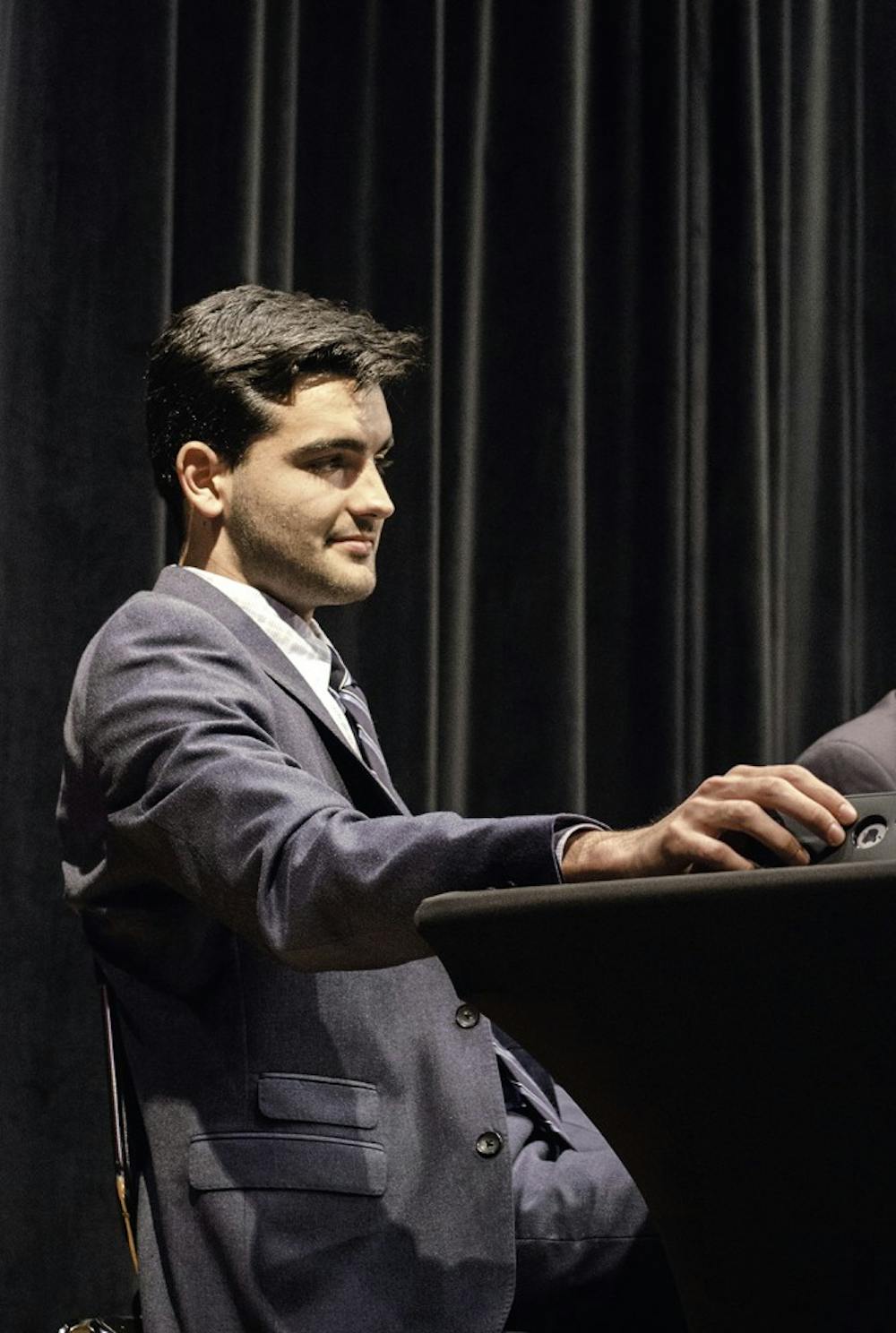College Democrats, Libertarians and Republicans went head-to-head on issues ranging from disarmament to South Carolina infrastructure at Carolina Clash on Monday evening.
Some of the questions were formulated by the moderators — opinion editors Linden Atelsek and Griffin Hobson and news editor Mary Ramsey from The Daily Gamecock — while other questions were pulled from audience members' tweets.
One prevalent question throughout current politics is the question of whether or not the U.S. has a moral obligation to accept refugees. College Democrats argued in favor of accepting refugees because of a responsibility to do so, while the College Republicans warned against the dangers of opening the U.S. to unknown threats.
"I don't want to live in that America that turns those in need away," said Evan Dodge, a College Democrat representative. "It says right there on the Statue of Liberty that we will welcome the huddled masses ... Our service to the world should not be bombing their houses and creating the quagmires that create this kind of social tension and then not being held accountable when people are left broken."
Bryan Hall, a representative from College Republicans, responded that while it is important to have compassion for refugees, the government's responsibility is to protect its people.
"There is only a few people who have the chance of being terrorists in these refugees, but keep in mind, it only took a few terrorists to bring down the Twin Towers during 9/11," Hall said. "It only took a few terrorists to kill many innocent people in Europe, in Paris and in Brussels."
One of the hottest topics was nuclear disarmament, which has been in progress in the U.S. since 1957 and has been a matter of debate given the fears about nuclear threats in North Korea and Iran.
College Libertarians representative Michael Rose took the middle ground, saying that the U.S. military is large enough to deal with any threats without nuclear force. College Democrats advocated for diplomatic solutions, and College Republicans argued for the continual maintenance of the military to defend against growing nuclear threats.
"Our aircrafts, our navy ships — they're all able to take out warheads and ICBMs (intercontinental ballistic missiles) before they ever come close to any of our allies," Rose said. "We are absolutely able to disarm and dismember any threat that actually comes to the United States continent."
The moderators also asked about so-called "religious liberty" laws, which have been passed in some states since the nationwide legalization of same-sex marriage. These laws are designed to protect people whose personal, religious or spiritual beliefs object to nonheterosexual relationships, but College Democrats objected to them on the basis that they do nothing except legalize discrimination.
College Republicans said the debate over same-sex marriage is over, but it is not the job of the government to force businesses to provide services if it goes against their beliefs.
"You're free to love whoever you want. You're free to marry whoever you want," Hall said. "I think the best promoters of social change should not be the government. I think it should be the consumers ... If consumers know that there's a certain business that's discriminating against people because of who they love or who they want to be with, I think that it's the consumer's moral obligation to boycott the business and get a movement started against the business. But at the end of the day, we live in a country where we believe in freedom of religion."
Questions also focused on more local issues, such as that of sex education in South Carolina. Current public school standards only require sex to be addressed in the context of heterosexual relationships, and contraception is only discussed as a family-planning tool. All three college parties agreed that sex education in the state is behind the times and should especially include more discussion of contraception.
"You can't tell kids, 'Just don't have sex.' That doesn't work," College Libertarian Michael Ferguson said. "This is part of libertarianism. If we're going to have these government programs, they need to be as best as they possibly can be. And if our sex education is sub par, which it is, then it needs to be fixed. Giving kids proper, real sex education is something that is necessary."
College Democrat Seth Ismail advocated for the greater discussion about LGBT topics and contraception in sex education classes.
"We need to start talking about contraception. We need to start having rational sex ed programs," Ismail said. "We do need to start confronting this issue that we have with alternative lifestyles ... These people don't feel like they're included. These people are regularly ignored, and they're continuously ignored in sex education ... It's a program in a school, a public program, that makes them feel like they're alone. And it makes them feel like that they're somehow weird for expressing themselves with how they were born."
In their closing statements, the parties attempted to summarize what their parties stand for, especially in the context of the future of the U.S.
College Democrats said that the government should play a role in making American successful and ensuring the fair treatment of all people. College Libertarians returned to their opening statement, which revolved around the idea that people should be able to do what they want as long as they aren't hurting anyone else. They stand for ideas such as private property, limited government and universal liberty. College Republicans advocated for smaller government in the interest of empowering and providing opportunities for the people.

